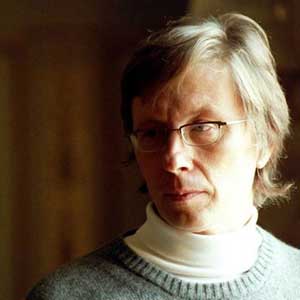
CONCERT | WELCOME: GEORG FRIEDRICH HAAS
July 1, 2013 marks Georg Friedrich Haas’s first day as a resident of the United States, where he will join the composition faculty at Columbia University. This move puts him squarely in the historical tradition of European composers such as Gustav Mahler, Arnold Schoenberg, and Igor Stravinsky, all of whom moved to the United States and became part of the musical life of America.
To celebrate the occasion, the Austrian Cultural Forum New York and the the Argento New Music Project present salient expressionist works of the Second Viennese School alongside the U.S. premiere of the vocal-instrumental version of Atthis, Haas’s dramatic and vocally virtuosic compostition for soprano and ensemble.
** Due to overwhelming popular demand, a second performance has been added on July 2nd, at 1PM. Please click >> here for tickets. **
Sharon Harms, soprano
Aaron Boyd, violin
Argento Chamber Ensemble
Michel Galante, conductor
PROGRAM
Georg Friedrich Haas
Atthis for soprano, clarinet, bassoon, horn, and string quintet
Alban Berg
Adagio from Kammerkonzert, arranged for quintet by Michel Galante
Anton Webern
Drei Stücke for cello and piano
Arnold Schoenberg
Sechs Kleine Klavierstucke for piano
ABOUT THE ARTISTS
Austrian spectral composer Georg Friedrich Haas has been teaching counterpoint, contemporary composition techniques, analysis, and introduction to microtonal music at the Musikhochschule in Graz since 1978, first as university lecturer, later as professor. In 1997, he took a sabbatical to be able to dedicate himself completely to composing. Since 2005 Haas has taught composition classes at the Conservatory of Music of the City of Basel Music Academy. Haas will will join Columbia University’s composition faculty as a full-time tenured professor in September 2013.
It is the remarkable multifacetedness that makes Haas’ music so fascinating. His works are filled with a dramaturgy of sound that reveals itself to the listener very directly, and above all nonverbally. They attest to a penetration of profane life with what can only be referred to as a mystical power of sound, a unification of the pleasant and the rough, the exuberant and the ugly, in a world of sound where dissonance represents the measure of all things rather than consonance. Haas is convinced that “the various musical traditions are not looking for conformity with the proportions of the partial tone series, but rather are trying to depart from it.” It’s not about union, but dissonance, he says. According to Haas, abstract chord develops its own independent quality, and therein lies the compositional conclusion (- Lisa Farthofer. The entire article is available >> here).
Works by Haas were featured in the Moving Sounds Festivals 2009 and 2010, and the composer and his oeuvre were also part of the Spring 2009 ACFNY Composer Series. An article on Haas by Bernhard Guenther was featured in issue #4 of transforum.
Called “Superb” and “Dramatically astute” by The New York Times, American soprano Sharon Harms has emerged as a fearless performer for the concert stage with a presence of profound artistry. A sought after musician of solo, chamber, and operatic repertoire, she holds a reputation for dramatic honesty and broad musical depth. An advocate for new works, Sharon has performed on numerous composition projects in addition to being a guest of music and theatre festivals. Sharon has worked with such composers as Gabriela Ortiz, Charles Wuorinen, Louis Karchin, Oliver Knussen, David Fulmer, Jesse Jones, David Dzubay, John Eaton, Brian Ciach, Elliott Bark, and Mark Oliveiro. She has been featured with Argento Chamber Ensemble, Ensemble Signal, the New Fromm Players, the Simon Bolivar Orchestra, the Pueblo Symphony, and Baroque Band of Chicago, among others. She held a two-year fellowship in the Opera and Vocal Studies Program at the distinguished Tanglewood Music Center where she received praise for her performances by the New York Times, The Boston Globe, Musical America, New Music Box, and The New Yorker.
Violinist Aaron Boyd was born in Pittsburgh, where he began playing the violin at the age of seven. He graduated in 2000 from the Juilliard School, where he studied with Sally Thomas and was coached by Harvey Shapiro. He has played as a member of the Metamorphosen and Orpheus chamber orchestras and tours frequently as a member of the International Sejong Soloists. He has participated in the Tanglewood, Fontainebleau, La Jolla SummerFest, Prussia Cove and Marlboro Music Festivals, where he has performed with members of the Beaux Arts Trio, as well as the Juilliard, Guarneri and Orion String Quartets. He has been a prize winner in numerous competitions including the Klein Violin Competition, the Tuesday Musical Society and the Pittsburgh Concert Society. As a member of the Milton String Quartet he recorded the première of Milton Babbitt’s Sixth String Quartet. Aaron Boyd frequently appears in the Bargemusic series.
The Argento Chamber Ensemble is the performance arm of the Argento New Music Project. The ensemble performs compositions that embody pressing musical concerns in Western music. Consisting of nine core members, the ensemble regularly expands to perform and record chamber orchestra works of up to 30 musicians. They have toured widely in the US and abroad, in festivals including the Norfolk Chamber Music Festival, the International Festival of Spectral Music/ Istanbul, the American Festival of Microtonal Music, the Sounds French Festival, the Kilkenny Arts Festival/ Ireland, and Shanghai´s International Festival of Electroacoustic Music. Argento has worked closely with leading composers such as Pierre Boulez, Tania Leon, Tristan Murail, Elliott Carter, Philippe Hurel, Gerard Pésson, Joshua Fineberg, and Philippe Leroux.
This concert is part of the special 2013 DIRECTOR’S CUT SERIES
ACFNY’s concerts during the month of June and July have been personally curated by Andreas Stadler who has served as the institution’s director since 2007. This summer, Stadler will depart the ACFNY, having left a legacy of world premieres, acclaimed performances, and culturally-fulfilled audiences. The concerts comprised in the special “Director’s Cut” Series represent the breadth of musical programming Stadler brought to the ACFNY during his tenure.
VENUE
ACFNY

